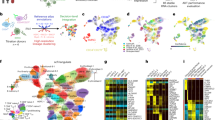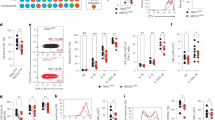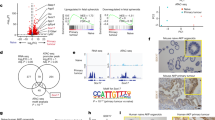Abstract
Ikaros is expressed in early hematopoietic progenitors and is required for lymphoid differentiation. In the absence of Ikaros, there is a lack of markers defining fate restriction along lympho-myeloid pathways, but it is unclear whether formation of specific progenitors or expression of their markers is affected. Here we use a reporter based on Ikaros regulatory elements to separate early progenitors in wild-type and Ikaros-null mice. We found previously undetected Ikaros-null lympho-myeloid progenitors lacking the receptor tyrosine kinase Flt3 that were capable of myeloid but not lymphoid differentiation. In contrast, lack of Ikaros in the common myeloid progenitor resulted in increased formation of erythro-megakaryocytes at the expense of myeloid progenitors. Using this approach, we identify previously unknown pivotal functions for Ikaros in distinct fate 'decisions' in the early hematopoietic hierarchy.
This is a preview of subscription content, access via your institution
Access options
Subscribe to this journal
Receive 12 print issues and online access
$209.00 per year
only $17.42 per issue
Buy this article
- Purchase on Springer Link
- Instant access to full article PDF
Prices may be subject to local taxes which are calculated during checkout





Similar content being viewed by others
References
Morrison, S.J., Uchida, N. & Weissman, I.L. The biology of hematopoietic stem cells. Annu. Rev. Cell Dev. Biol. 11, 35–71 (1995).
Kondo, M. et al. Biology of hematopoietic stem cells and progenitors: implications for clinical application. Annu. Rev. Immunol. 21, 759–806 (2003).
Lemischka, I.R. Clonal, in vivo behavior of the totipotent hematopoietic stem cell. Semin. Immunol. 3, 349–355 (1991).
Kondo, M., Weissman, I.L. & Akashi, K. Identification of clonogenic common lymphoid progenitors in mouse bone marrow. Cell 91, 661–672 (1997).
Akashi, K., Traver, D., Miyamoto, T. & Weissman, I.L. A clonogenic common myeloid progenitor that gives rise to all myeloid lineages. Nature 404, 193–197 (2000).
Spangrude, G.J., Heimfeld, S. & Weissman, I.L. Purification and characterization of mouse hematopoietic stem cells. Science 241, 58–62 (1988).
Morrison, S.J. & Weissman, I.L. The long-term repopulating subset of hematopoietic stem cells is deterministic and isolatable by phenotype. Immunity 1, 661–673 (1994).
Weissman, I.L., Anderson, D.J. & Gage, F. Stem and progenitor cells: origins, phenotypes, lineage commitments, and transdifferentiations. Annu. Rev. Cell Dev. Biol. 17, 387–403 (2001).
Adolfsson, J. et al. Upregulation of Flt3 expression within the bone marrow Lin− Sca1+c-kit+ stem cell compartment is accompanied by loss of self-renewal capacity. Immunity 15, 659–669 (2001).
Christensen, J.L. & Weissman, I.L. Flk-2 is a marker in hematopoietic stem cell differentiation: a simple method to isolate long-term stem cells. Proc. Natl. Acad. Sci. USA 98, 14541–14546 (2001).
Osawa, M., Hanada, K., Hamada, H. & Nakauchi, H. Long-term lymphohematopoietic reconstitution by a single CD34-low/negative hematopoietic stem cell. Science 273, 242–245 (1996).
Yang, L. et al. Identification of Lin− Sca1+c-kit+CD34+Flt3− short-term hematopoietic stem cells capable of rapidly reconstituting and rescuing myeloablated transplant recipients. Blood 105, 2717–2723 (2005).
Igarashi, H., Gregory, S.C., Yokota, T., Sakaguchi, N. & Kincade, P.W. Transcription from the RAG1 locus marks the earliest lymphocyte progenitors in bone marrow. Immunity 17, 117–130 (2002).
Allman, D. et al. Thymopoiesis independent of common lymphoid progenitors. Nat. Immunol. 4, 168–174 (2003).
Schwarz, B.A. & Bhandoola, A. Circulating hematopoietic progenitors with T lineage potential. Nat. Immunol. 5, 953–960 (2004).
Adolfsson, J. et al. Identification of Flt3+ lympho-myeloid stem cells lacking erythro-megakaryocytic potential a revised road map for adult blood lineage commitment. Cell 121, 295–306 (2005).
Lessard, J., Faubert, A. & Sauvageau, G. Genetic programs regulating HSC specification, maintenance and expansion. Oncogene 23, 7199–7209 (2004).
Busslinger, M. Transcriptional control of early B cell development. Annu. Rev. Immunol. 22, 55–79 (2004).
Rothenberg, E.V. & Taghon, T. Molecular genetics of T cell development. Annu. Rev. Immunol. 23, 601–649 (2005).
Friedman, A.D. Transcriptional regulation of granulocyte and monocyte development. Oncogene 21, 3377–3390 (2002).
Cantor, A.B. & Orkin, S.H. Transcriptional regulation of erythropoiesis: an affair involving multiple partners. Oncogene 21, 3368–3376 (2002).
Georgopoulos, K., Moore, D.D. & Derfler, B. Ikaros, an early lymphoid-specific transcription factor and a putative mediator for T cell commitment. Science 258, 808–812 (1992).
Georgopoulos, K. et al. The Ikaros gene is required for the development of all lymphoid lineages. Cell 79, 143–156 (1994).
Wang, J.H. et al. Selective defects in the development of the fetal and adult lymphoid system in mice with an Ikaros null mutation. Immunity 5, 537–549 (1996).
Winandy, S., Wu, P. & Georgopoulos, K. A dominant mutation in the Ikaros gene leads to rapid development of leukemia and lymphoma. Cell 83, 289–299 (1995).
Hahm, K. et al. The lymphoid transcription factor LyF-1 is encoded by specific, alternatively spliced mRNAs derived from the Ikaros gene. Mol. Cell. Biol. 14, 7111–7123 (1994).
Nichogiannopoulou, A., Trevisan, M., Neben, S., Friedrich, C. & Georgopoulos, K. Defects in hemopoietic stem cell activity in Ikaros mutant mice. J. Exp. Med. 190, 1201–1214 (1999).
Mackarehtschian, K. et al. Targeted disruption of the flk2/flt3 gene leads to deficiencies in primitive hematopoietic progenitors. Immunity 3, 147–161 (1995).
Sitnicka, E. et al. Key role of flt3 ligand in regulation of the common lymphoid progenitor but not in maintenance of the hematopoietic stem cell pool. Immunity 17, 463–472 (2002).
Kim, J. et al. Ikaros DNA-binding proteins direct formation of chromatin remodeling complexes in lymphocytes. Immunity 10, 345–355 (1999).
O'Neill, D.W. et al. An Ikaros-containing chromatin-remodeling complex in adult-type erythroid cells. Mol. Cell. Biol. 20, 7572–7582 (2000).
Harker, N. et al. The CD8α gene locus is regulated by the Ikaros family of proteins. Mol. Cell 10, 1403–1415 (2002).
Kaufmann, C. et al. A complex network of regulatory elements in Ikaros and their activity during hemo-lymphopoiesis. EMBO J. 22, 2211–2223 (2003).
Miyamoto, T. et al. Myeloid or lymphoid promiscuity as a critical step in hematopoietic lineage commitment. Dev. Cell 3, 137–147 (2002).
Akashi, K. et al. Transcriptional accessibility for genes of multiple tissues and hematopoietic lineages is hierarchically controlled during early hematopoiesis. Blood 101, 383–389 (2003).
Metcalf, D., Johnson, G.R. & Mandel, T.E. Colony formation in agar by multipotential hemopoietic cells. J. Cell. Physiol. 98, 401–420 (1979).
Nakahata, T. & Ogawa, M. Clonal origin of murine hemopoietic colonies with apparent restriction to granuclocyte-macrophage-megakaryocyte (GMM) differentiation. J. Cell. Physiol. 111, 239–246 (1982).
Schmitt, T.M. & Zuniga-Pflucker, J.C. Induction of T cell development from hematopoietic progenitor cells by delta-like-1 in vitro. Immunity 17, 749–756 (2002).
Phillips, R.L. et al. The genetic program of hematopoietic stem cells. Science 288, 1635–1640 (2000).
D'Amico, A. & Wu, L. The early progenitors of mouse dendritic cells and plasmacytoid predendritic cells are within the bone marrow hemopoietic precursors expressing Flt3. J. Exp. Med. 198, 293–303 (2003).
Martin, C.H. et al. Efficient thymic immigration of B220+ lymphoid-restricted bone marrow cells with T precursor potential. Nat. Immunol. 4, 866–873 (2003).
Terszowski, G. et al. Prospective isolation and global gene expression analysis of the erythrocyte colony-forming unit (CFU-E). Blood 105, 1937–1945 (2005).
Lopez, R.A., Schoetz, S., DeAngelis, K., O'Neill, D. & Bank, A. Multiple hematopoietic defects and delayed globin switching in Ikaros null mice. Proc. Natl. Acad. Sci. USA 99, 602–607 (2002).
Acknowledgements
We thank J. Yetz-Aldape for cell sorting; R. Czyzewski for mouse husbandry; X. Qi for technical support; and B.A. Morgan and the Georgopoulos laboratory for critical reading of the manuscript. Supported by the National Institutes of Health (5R37 R01 AI33062 to K.G. and 5T32 AI07529 to S.Y.N.), the Human Frontier Science Program (T.Y.) and the Transplantation Biology Research Center at Massachusetts General Hospital (S.Y.N.).
Author information
Authors and Affiliations
Corresponding author
Ethics declarations
Competing interests
The authors declare no competing financial interests.
Supplementary information
Supplementary Fig. 1
Distribution of the Ikaros-GFP reporter in the wild-type (WT) and Ikaros-null (Null) LSK and LK compartments. (PDF 69 kb)
Supplementary Fig. 2
Post-sort purity of the LK-GFPhi population. (PDF 655 kb)
Supplementary Fig. 3
Kinetics of T and B cell development from wild-type Ikaros-GFP LSK populations. (PDF 536 kb)
Supplementary Fig. 4
Analysis of lineage—Ikaros-GFP subsets for expression of CD34, and CD16/32 and Flt3 on various genetic backgrounds. (PDF 562 kb)
Supplementary Fig. 5
Cell fate decisions in the early hematopoietic hierarchy and their regulation by Ikaros. (PDF 334 kb)
Supplementary Table 1
Limiting dilution analysis of T cell differentiation from wild-type and Ikaros-null LSK cells. (PDF 20 kb)
Supplementary Table 2
Primers and PCR conditions used to examine lineage-specific genes expression in LK and LSK populations (PDF 83 kb)
Rights and permissions
About this article
Cite this article
Yoshida, T., Yao-Ming Ng, S., Zuniga-Pflucker, J. et al. Early hematopoietic lineage restrictions directed by Ikaros. Nat Immunol 7, 382–391 (2006). https://doi.org/10.1038/ni1314
Received:
Accepted:
Published:
Issue Date:
DOI: https://doi.org/10.1038/ni1314
This article is cited by
-
IKAROS and AIOLOS directly regulate AP-1 transcriptional complexes and are essential for NK cell development
Nature Immunology (2024)
-
IKAROS: from chromatin organization to transcriptional elongation control
Cell Death & Differentiation (2023)
-
Mutated IKZF1 is an independent marker of adverse risk in acute myeloid leukemia
Leukemia (2023)
-
Activated interleukin-7 receptor signaling drives B-cell acute lymphoblastic leukemia in mice
Leukemia (2022)
-
The telomere complex and the origin of the cancer stem cell
Biomarker Research (2021)



